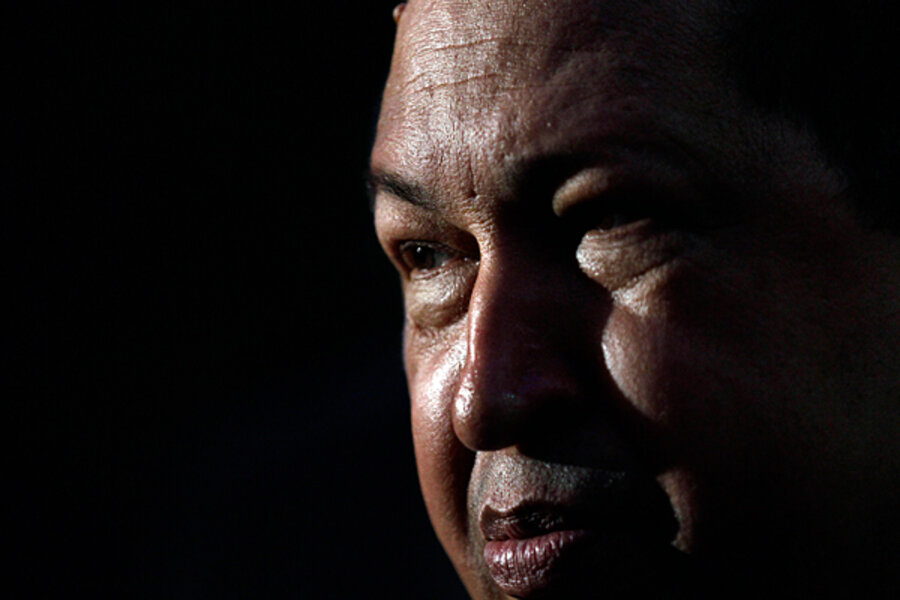Is Venezuela's military playing role in drug trafficking?
Loading...
• A version of this post ran on the author's site, Insightcrime.com. The views expressed are the author's own.
Allegations that Venezuelan President Hugo Chavez knew of drug trafficking charges against his new defense minister not only suggest institutional corruption in the security forces, but that the president is unwilling, or unable, to take action.
In 2008, the US Treasury included Henry Rangel Silva on its list of Specially Designated Narcotics Traffickers (SDNT), claiming that the general helped the Revolutionary Armed Forces of Colombia (FARC) smuggle cocaine into Venezuela. When Chavez appointed Rangel as minister of defense, the Bolivarian leader laughed off the accusations, saying that attacks against Rangel were propaganda designed to delegitimize the Venezuelan military.
As evidence, US officials had pointed to files found on computers and disks belonging to FARC commander Luis Edgar Devia Silva, alias “Raul Reyes” after Colombian forces assassinated him in 2008. Rangel is mentioned by name in the files, allegedly meeting with Rodrigo Londoño, alias "Timochenko," among others. Timochenko is now commander-in-chief of the FARC, after taking over the leadership of the Colombian rebel group in November last year when his predecessor Guillermo Leon Saenz, alias "Alfonso Cano," was killed by troops.
But while Chavez dismisses these allegations, recent evidence suggests that officials in his government notified him of them long before the US government added Rangel to its list of international drug traffickers. According to El Nuevo Herald, Chavez promoted him several times despite having been informed about his alleged links to drug trafficking. The Herald cites an “internal government report” dating back to 2007 which voices concern over Rangel’s connection to an earlier incident in which army officials were arrested while transporting 2.2 tons of cocaine. The document claims there was sufficient evidence linking Rangel to the case, and recommended that officials open an investigation into the matter, including an audit of his income.
It is likely that Rangel was promoted despite these claims due to his unquestioning loyalty to Chavez and the “Bolivarian Revolution.” In late 2010 the general declared that the armed forces were “married to the socialist political project,” (in Spanish) adding that the military would not accept an opposition victory in this year’s presidential elections, “much less the people.”
Rangel is not the only Venezuelan official that the US has accused of drug trafficking ties. Two other officials were put on the SDNT list in 2008, and four more were added to the list in September. One of the most recent additions is General Cliver Alcala Cordones, who is in charge of the military’s 4th Armored Division. According to the Treasury’s press release, he used his position to establish a drugs-for-guns trade with the rebels, suggesting high-level complicity with the illicit narcotics trade on the part of the Venezuelan military.
InSight Crime spoke to senior international intelligence officials and contacts on the ground about the Venezuela situation. There have long been elements in the military that have facilitated the trafficking of drugs, the so-called Cartel de los Soles (Cartel of the Suns), so named after the gold stars that Venezuela generals wear on their epaulettes. The military is not only present along the border with Venezuela, but controls many of the departure points like Caracas' international airport Maiquetia and the port of Puerto Cabello, thus putting it in a perfect position to move drug shipments.
While the role of the Cartel de los Soles as a facilitating organization appears clear, thanks to testimony from drug trafficker Walid Makled, there are indications that it is shifting from simply facilitating the passage of drugs to actually taking direct control of shipments and routes.
RELATED: Think you know Latin America? Take our geography quiz.
While Venezuela has an impressive record in capturing and extraditing top drug traffickers, like Maximiliano Bonilla Orozco, alias "Valenciano," arrested in November 2011, there have been allegations that some elements of the military have located these capos, or drug czars, and extorted money from them, and then once they have been bled dry, they are arrested and their routes taken over.
While Colombian groups have traditionally controlled drug trafficking in Venezuela, there are indications that corrupt elements of the military are now becoming players and developing their own contacts with Mexican cartels.
Much of Chavez's regime relies on active or former military personnel, not just in the armed forces but throughout the organs of the state. It may be that while he is well aware of the allegations of drug trafficking in the military, the president is unable to challenge such powerful interest without undermining his own power base.
The promotions of both Rangel and Timochenko to the top of their respective organizations prompts one to consider where this relationship between the two men, if still intact, could go, with serious implications not just for the trafficking of drugs through Venezuela, but the future of Colombia's 48-year civil conflict.
–– Geoffrey Ramsey is a writer and Jeremy McDermott is a director for Insight – Organized Crime in the Americas, which provides research, analysis, and investigation of the criminal world throughout the region.





